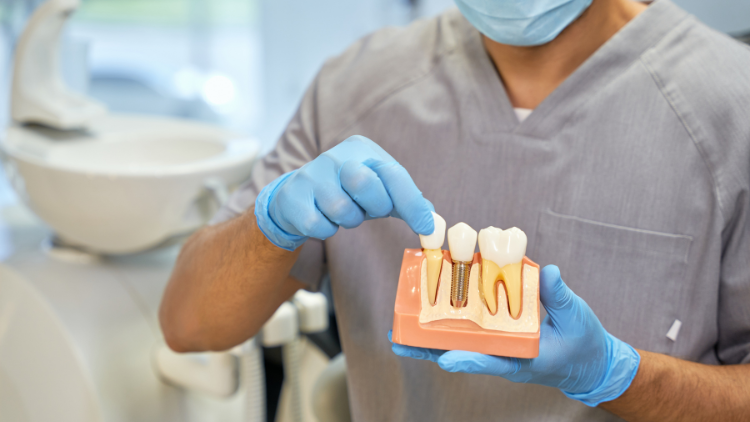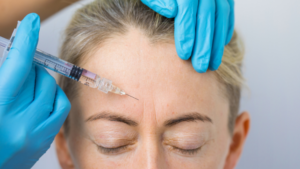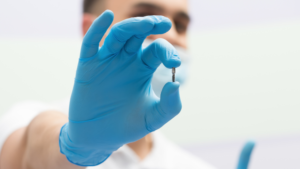Dental implants are an effective, long-lasting (and aesthetically-pleasing) treatment that your dentist may advise to replace a decayed tooth, fill a gap in your teeth, and protect the surrounding teeth.
What many patients already know is that gum health matters in making dental implants viable – but they might not know the specifics of how gum disease can affect the success of an implant.
Two of the most common questions we hear about dental implants and gum disease are:
- Can you get dental implants with gum disease?
- Can you get dental implants with bone loss?
As there is a lot of information online that can cause uncertainty, our expert periodontist will provide a final answer in this blog, so read on.
A quick explainer – dental implants and the gums
As a simple explanation, dental implants are formed of three parts1:
- The base: a titanium screw, which is inserted into the bone under the gumline.
- The abutment: an attachment to the screw the protrudes above the gumline.
- The crown: the visible ‘tooth’ that covers the abutment.
These different elements are inserted in stages to complete a single ‘implant’, and the simple reason for this is to allow time (a few months) for the bone to integrate with the screw, and the surrounding gums to heal in preparation for insertion of the abutment and the crown.
This gives us a clue about the answer to our question…
Can you get dental implants with gum disease?
When considering implant surgery, your periodontist will consider a number of factors before proceeding. These include:
- The health of your gums (including the severity of the gum disease you are experiencing)
- The level of bone loss (if any)
- Other factors, such as your age, genetic profile, and whether or not you smoke (which can affect your gum health, independently of your day-to-day oral hygiene routine).
All of this matters, because the main goal of a periodontist is to ensure the longevity of the implant, and to minimise the risk of it causing further complications (such as ‘peri-implantitis’, or damage to the tissue and bone around the implant).
As gum disease is one of the most common causes of dental implant failure1, we ensure that any form of it is treated prior to inserting the implant.
| A note on gum disease… It is important to remember that gum disease comes in different forms, but it is mainly caused by a build-up of plaque resulting from poor oral hygiene. When we talk about gum disease, we are usually talking about one of two things: Less severe gum problems – such as tissue inflammation (gingivitis) – which are often reversible with good oral hygiene.More substantial damage, such as infections, damage to the gum tissue and even the surrounding bone (severe periodontitis), which will require a dentist’s intervention3. Learn more about treating gum disease |
We are also asked from time to time ‘will dental implants help with gum disease?’ or ‘can dental implants cure gum disease?’.
As we have established, your gums need to be in a healthy condition in order to proceed with a dental implant – but the implants themselves can be the catalyst for gum disease if you don’t maintain good oral hygiene and monitor their condition.
The other major question relating to implants is to do with bone loss, so let’s look at that.
Can you get dental implants with bone loss?
As implants are secured in the bone under your gums, that bone needs to be of sufficient volume and condition in order to take the implant.
Certain factors can affect the quantity and quality of bone in your jaw. These include:
- Gum disease in the affected area.
- Having had a missing tooth or teeth for more than 3 months.
- Having ill-fitting dentures (if they cause you pain, they likely are damaging your bone).
- Other natural causes for a loss in bone density, such as age – this is particularly true for post-menopausal women.
However, like some forms of gum disease, you may be surprised to know that bone loss can be reversed – or at least, compensated for.
If our X-rays reveal that you do not have enough bone in your jaw to reliably support implants, we can grow bone in 2 ways:
- Taking bone from one part of your mouth and inserting it into the area that requires extra bone.
- Placing a material that stimulates bone regeneration (such as Geistlich Bio-Oss® or EthOss®) into the affected area.
We refer to both of these procedures as bone grafts.
Equally, if extra bone is required underneath the sinus, then we may need to lift your sinus in order to accommodate the extra bone. This is an additional procedure to the bone graft.
To summarise, even with bone loss, dental implants can be fitted – but this will depend on you having a consultation with a dental professional to analyse your particular oral health situation.
Book a dental implants consultation with 92 Dental
Having gum disease right now doesn’t prevent you from seeking advice about implants.
After all, it’s estimated that anywhere up to 90% of adults in the UK have some form of gum disease, and many of us aren’t aware of the early signs of a problem like gingivitis, which can be easily corrected ahead of an implant procedure.
Fundamentally, the most important thing to remember is that implants are an excellent way to not just replace a decayed or missing tooth, but also preserve the health and comfort of the rest of your mouth – so if your periodontist does recommend implants, they will do so knowing that the condition of your gums is good enough to accept them.
If you are looking to close a gap in your teeth and restore your smile and oral health to their best condition, book a consultation with us today to discuss our Hammersmith dental implant services or call our friendly reception team on 020 3811 2969.
| Meet your periodontist: Dr. Ruben Garcia Dr Ruben Garcia is our resident surgeon with comprehensive experience in dental implant placement. He has worked with complex cases requiring bone augmentation procedures and sinus lifts and has placed several thousand dental implants in his time. Internationally accredited as a specialist in periodontics, Ruben has worked in practices across London for over 15 years and has produced ground-breaking research to maximise the benefits and aesthetics of dental implants. |
This information in this article has been written and verified for accuracy by the 92 Dental staff.
- Specialist Periodontist and Implantologist: Dr. Ruben Garcia
- Principal Dentist: Dr. Moira Baldiraghi
References:
1 – European Federation of Periodontology (The Oral Health & Gum Hub), Dental Implants Explained. Retrieved at: https://www.efp.org/for-patients/dental-implants/dental-implants-explained
2 – Z. Jilonova et. al, Common Problems with Dental Implants, International Journal of Research, May 2020. Retrieved at: https://inlibrary.uz/index.php/archive/article/view/14288
3 – National Institute for Health and Care Excellence, Gingivitis and Periodontitis. Retrieved at: https://cks.nice.org.uk/topics/gingivitis-periodontitis/
4 – National Institute for Health and Care Excellence, Gingivitis and Periodontitis: How Common is it? Retrieved at: https://cks.nice.org.uk/topics/gingivitis-periodontitis/background-information/prevalence




